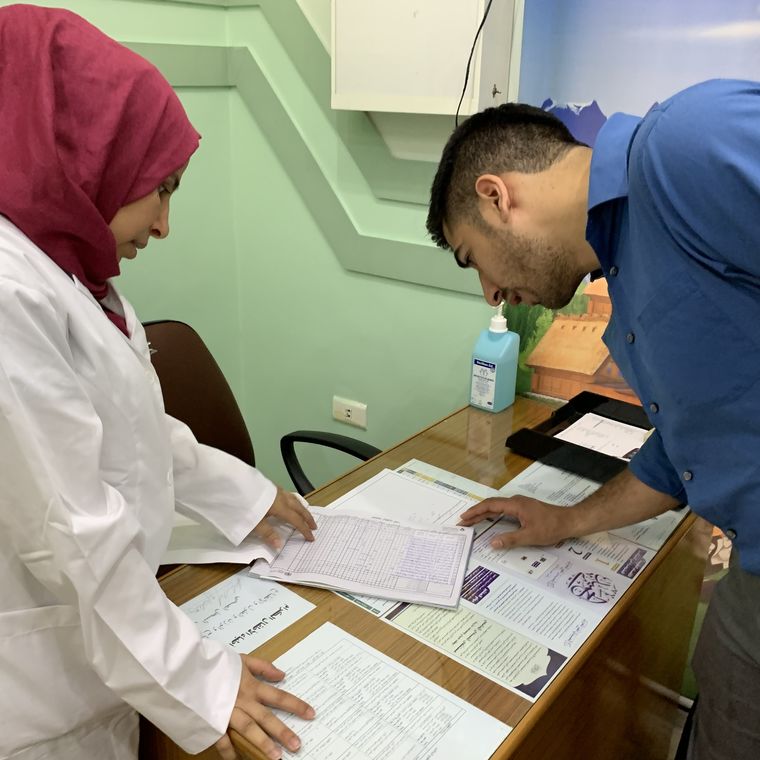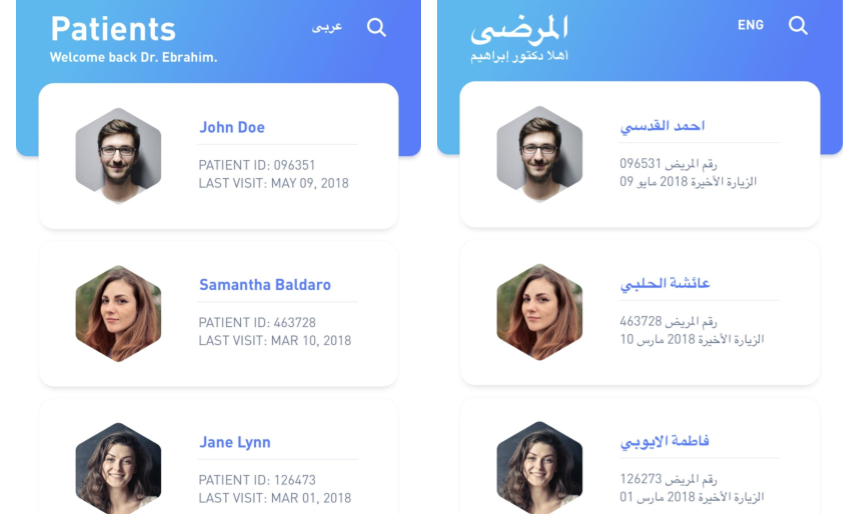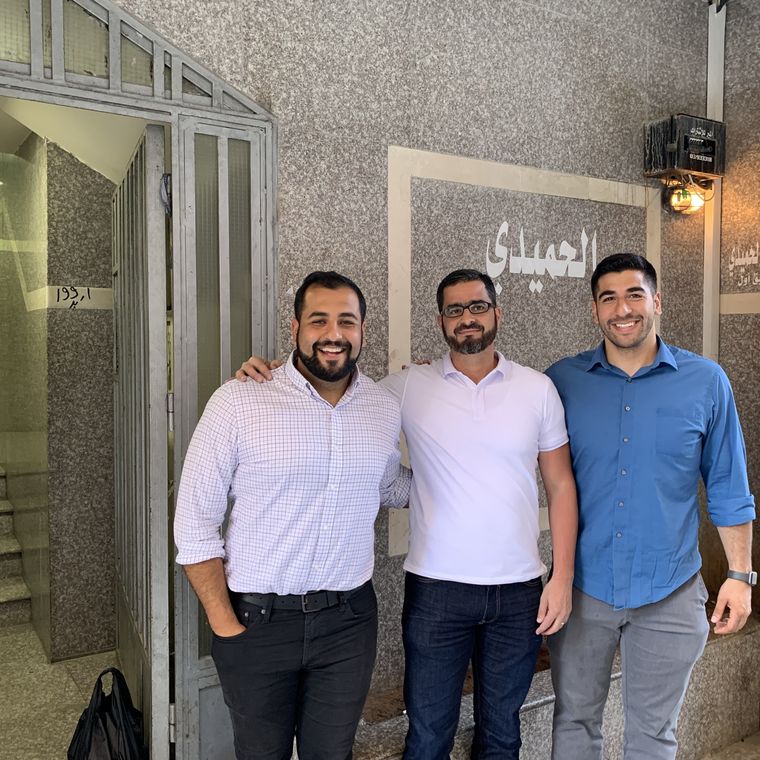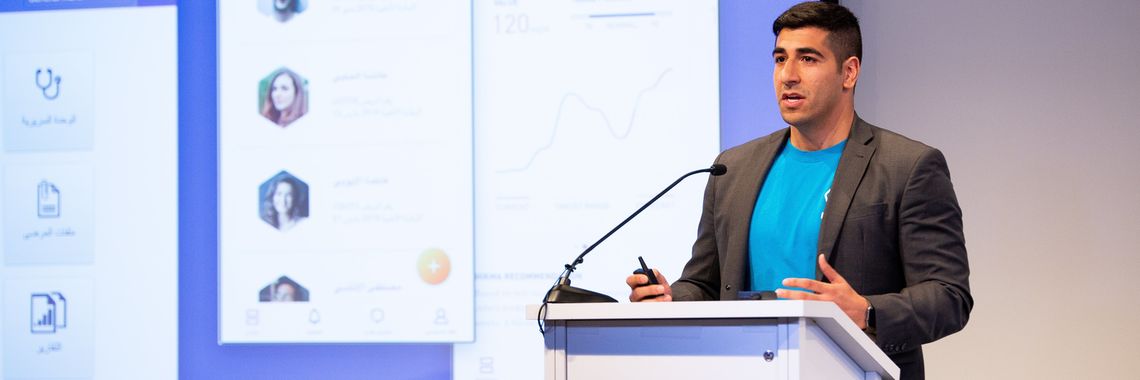P.D. Soros Fellowship for New Americans
If you are an applicant and need to sign into the online application, you can find the link on the "Apply" page of our website: Apply Page.
If you are a fellow looking to login, please note that we are currently updating our backend system for managing Fellow data. In the meantime, to update your information for the Fellowship, please send updates to Nikka Landau at nlandau@pdsoros.org.
Senan Ebrahim: Building a Platform for Refugee Health
-

Hikma Health founder Senan Ebrahim examining paper medical record systems at the Hamidy clinic in northern Lebanon.
In 2017, Senan Ebrahim was in his third year of his PhD, and like most doctoral students he had a full plate. He had finished his preclinical courses at Harvard Medical School and was immersed in his PhD research, focused on leveraging machine learning approaches to predict seizures in epilepsy. But as the son of a Syrian immigrant, Senan, a 2013 Paul & Daisy Soros Fellow, was also closely following the Syrian Civil War and the resulting refugee crisis. Just one year earlier, his grandmother had finally left Syria, where she had lived her entire life.
In Cambridge, Senan had been volunteering for Syrian refugees and learning about their significant unmet needs. “Two years ago, at dinner with some physicians returning from their medical mission for refugees in Jordan, my co-founder and I heard their overwhelming need for an affordable, customized, integrated health data system,” Senan explained. “That dinner conversation was our aha moment, in which we jointly realized how we could make an impact at scale by serving refugee patients in partnership with clinics.”
That conversation was the beginning of Hikma Health.
Working together with his brother, Hassaan Ebrahim, and friends Erik Grueter and Dr. Firas Bounni, Senan developed the early concept of an organization focused on refugee health technology in the MIT Media Lab’s Refugee Learning Accelerator.
Two years later, Hikma Health is a registered non-profit based in San Jose with three full-time staff members and 35 active volunteers, and they’re on the precipice of deploying their health data system for the first time.
“We envision the free and open source Hikma Health system becoming the premier product used worldwide for refugee care. The Hikma system effectively improves access to health data for both patients and providers, and we expect adoption to be high,” Senan said.
Senan believes that Hikma Health can deliver in a big way for patients, clinicians, and clinic managers.
-

Hikma Health's mobile electronic health record system enables physicians to record and access their patients' data online or offline in multiple languages.
-

Hikma Health founders Senan (right) and Hassaan Ebrahim (left) with physician Dr. Rechdi Ahdab (center) at the Hamidy clinic in northern Lebanon.
For patients, Hikma can provide them direct access to their health data, along with relevant health educational material. For clinicians, Hikma can give them patient data in a concise and easy to review format. Plus, they can share a patient’s history, if authorized by the patient, with other clinicians in the Hikma system. They can also use predictive analytics to include recommendations based on the individual’s case. For clinic managers, which Senan says can be one of the most challenging roles, Hikma will be able to help them anticipate operational challenges and plan accordingly.
“We will construct predictive models to support clinical decision-making and improve health outcomes for refugee patients,” Senan explained. “We aim to combine this forecasting with appropriate education so we empower the patients to understand what, for example, a projection of a particular blood glucose level really means for them. This forecasting is especially helpful in the refugee setting, where receiving regular on-schedule care for chronic diseases is rare. Patients generally wait until acute complications arise, which are not always manageable.”
Over the past two years the organization’s leaders have developed their product by observing refugee patients and their physicians in Turkey, Jordan, and Lebanon. “We surveyed the physicians rigorously regarding their needs for a health data system in the refugee care setting,” Senan noted. “We then rapidly iterated to develop several prototypes of the software and conducted extensive A/B testing with our physician test users.” They collaborated with Google, MIT, and the Harvard Medical School Bioinformatics Department to improve the system. The team identified key needs unique to the refugee setting, such as offline data availability in remote settlements and camps. In August, they released their mobile application for Android free and open source, the first to include integrated offline sync capability.
In the coming months, Hikma Health will be launching a partnership with the Hamidy Charitable Organization in Lebanon to serve low-income Lebanese people as well as Syrian and Palestinian refugees. “We are now exploring potential partnerships with clinical NGOs in Bangladesh, Yemen, Uganda, Congo, Colombia, Haiti, Mexico and within the United States,” Senan explained. “One advantage of being a software organization is that with relatively small modifications to our core product, we can replicate our success at massive scale and low cost.”
Born and raised in Silicon Valley, Senan has always been passionate about science as a way to improve society. As a Harvard undergraduate, he studied neuroscience, was elected president of the Harvard College student body, and volunteered for a program called Boston Refugee Youth Enrichment, where he taught debate and public speaking. “Those students taught me lasting lessons about the many social challenges faced by refugee families in their adoptive countries, which impact their physical and mental health,” Senan said of the experience.
One of Senan’s biggest inspirations is his grandmother who has been a great advocate for Hikma Health. She was born and raised in Damascus, Syria and lived in the same house with his grandfather there for 60 years. “Before the war, we used to visit her with our cousins every summer, gathering at her table for memorable family lunches. During the war, none of us could visit from the US or Canada, but she insisted on continuing to live in Damascus for as long as possible,” Senan explained. His grandmother left once water and electricity became scarce.
Despite having been displaced from her homeland, Senan says his grandmother remains positive. She even came up with a fundraiser for Hikma Health and knit prizes for the event. Senan, along with his brother and co-founders, will carry that legacy forward as they continue to build Hikma Health into a global organization serving those who can benefit most from their care. ∎
© 2024
